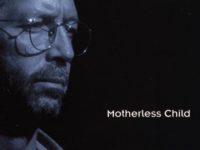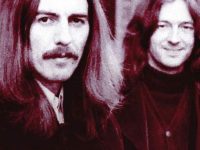Pilgrim was, on its face, a sharp, brave attempt at modernizing Eric Clapton’s core sound. You hear solid licks situated amongst the prevailing R&B production values of today — keyboards and drum programming, both swirling orchestrations and smooth female backing vocals, these car-frame rattling bass beats. But the album, now available with a sparkling remaster from Steve Hoffman via Audio Fidelity, was much more than that.
Pilgrim was, save for Layla and Other Assorted Love Songs, the most intimate, starkly honest recording Clapton had issued to that point. This 1998 effort, Eric Clapton’s first album of original material since 1989’s Journeyman, sounds nothing like the restless Clapton’s previous personas as comfy 1990s acoustic-blues throwback, perfectly coifed 1980s MOR rocker, calm and collected 1970s balladeer or frenzied 1960s rock experimentalist.
So, of course, Pilgrim tanked. Shows that year in venues like the Louisiana Superdome were curtained off to one-third of their expanse, as promoters tried to create a sense of intimacy out of the faltering ticket sales. Funny thing is, Clapton’s new album actually sounded better in a smaller space. This is confidential music, made to be heard up close.
On the minor hit “My Father’s Eyes,” we find a wounded Eric Clapton “praying for the healing rain to restore my soul again” — referencing both his lost parental relationship but also the son who fell to his death in 1991. Moments like these made Pilgrim into a lost classic of romantic proportions. If there is any justice, these newly minted limited edition gold discs will rectify this injustice, as Hoffman’s work does much to reveal the depth of this introspective, ambitious and now entirely overlooked project.
Fully engaged in a way we seldom heard since his Derek and the Dominos collaboration from nearly three decades before, Clapton wrote or co-wrote all but two songs on Pilgrim. (The others are Bob Dylan’s “Born in Time” and an old blues called “Going Down Slow” by St. Louis Jimmy.) Co-producer Simon Climie helped Clapton create a new template along the way, one that had less to do with Muddy Waters than it did Al Green. He pushed himself to places few would have guessed after a period of largely unsatisfying albums with Phil Collins and on movie soundtracks, then a mainstream backtrack with the MTV Unplugged recording.
That’s best heard on the title track from Pilgrim, featuring the most shatteringly raw singing yet for Eric Clapton — a steadfast sideman who long refused to take centerstage and, when he did, often sounded timid or rote at the mic. Not here. Clapton — synthesizing everything that is special about Curtis Mayfield’s work — presents himself for the first time not as guitar god, but as bone-deep soul singer: “How do I choose, where do I draw the line, between truth and necessary pain,” Clapton pleads, “and how do I know, and where do I get my belief, that things will be alright again?”
Everything here opens the door for Clapton’s stirring vocal successes on subsequent albums like Old Sock and, in particular, Reptile.
Elsewhere, the album is buoyed by other, just as moving ruminations on lost love and lost moments, including “River of Tears,” the grinding “One Chance” and “Circus,” about an outing Clapton took before his son’s passing — the tragedy that became an inspiration for his emotional hit “Tears In Heaven” from six years before. Clapton, the singer, can be heard reaching for elements of Stevie Wonder and Junior Wells, crooning, barking and yowling his way to a series of rare and personal ruminations.
There are times, of course, when Clapton’s sweeping ambition fails him. Most balked at the record’s modernity. Not every song works. In this context, for instance, the skiffle-influenced “Fall Like Rain” somehow felt out of place. But Pilgrim actually goes deeper than Unplugged and the prior roots covers album From the Cradle, could have imagined — traveling in a brilliant way past poignancy into true sorrow. Even with the synths, Pilgrim might just be Eric Clapton’s truest, best blues record.
- How Deep Cuts on ‘Music From Big Pink’ Underscore the Band’s Triumph - July 31, 2023
- How ‘Islands’ Signaled the Sad End of the Band’s Five-Man Edition - March 15, 2022
- The Band’s ‘Christmas Must Be Tonight’ Remains an Unjustly Overlooked Holiday Classic - December 25, 2016




